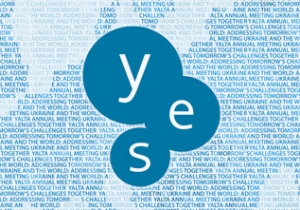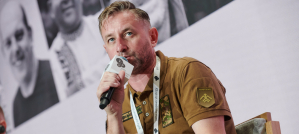Condoleezza Rice: Over the Last Decade the World Experienced Three Global Shocks

In 21st century, the world experienced three “global shocks” that have changed the world dramatically, said Dr. Condoleezza Rice, 66th Secretary of State of the United States in her special speech at the session on “The Future of the Global Order and Security” of the 9th Yalta Annual Meeting.
“During the latest decade the international system experienced three global shocks. It is much for ten years. And no wonder that the world feels the changes are too rapid and, sometimes, uncontrolled and dangerous,” Dr. Rice emphasized.
In her opinion, the first shock was the events of September 11th, 2011. As a result of the attacks on the World Trade Centre and the governmental buildings, the US citizens have changed their perception of physical safety. “We also have realized that the biggest threat originates not from collisions among large and powerful countries, but from the countries like Afghanistan, from terrorist groups.”
Only an attack with the use of mass destruction weapons, Dr. Rice continued, could be more awful than the attack of 11th of September. “Potential combination of the most dangerous world’s weapons with the most dangerous players poses the severest threat to the international security,” she stated.
The second global shock, in Dr. Rice’s opinion, was the 2008 financial crisis that challenged the world’s economic security. The idea of savings changed – real property stopped to be a reliable investment object.
Many people lost their jobs and there are serious doubts whether they would be able to get any jobs in future. As a result of this shock, the world found out that “technologies punish those people whose education is insufficient. The jobs paid 8 dollars per hour disappeared. And those who were afraid of not finding a job received a good reason to be afraid of it.” This shock entailed dramatic social consequences – in particular, the conflicts arose between governments and peoples, including on the retirement age issue.
Finally, the third shock named by Dr. Rice was the Middle East revolution. “Current events demonstrate very clearly: authoritarianism is unstable. Sooner or later people would demand the same rights as those that people enjoy in the democracies,” the US ex-Secretary of State said. And this is a big lesson for all leaders practicing an authoritarian style in running the country. An alternative to the spread of democracy would be a revolution that is far worse scenario than reforms.
“People’s wrath is an awful path of political reforms, this is a wrong path. Revolutions rarely are a positive scenario of development. Revolutions are ugly, cruel, lead to incomprehensible, unpredictable, unstable results,” Condoleezza Rice emphasized.
Having experienced the three global shocks, the world has changed dramatically. In the days like these, Ms. Rice believes it is important to focus on fundamental things. “Where tectonic quakes take place we should think over how we can change our approaches, how we can secure more liberty, more safety and better world,” she noted.
The 9th Yalta Annual Meeting entitled “Ukraine and the World: Addressing Tomorrow’s Challenges Together” takes place in Yalta at the Livadia Palace, Ukraine, from 13-16 September 2012. More than 200 leaders from politics, business and society representing more than 20 countries will discuss major global challenges and their impact on Europe, Ukraine and the world.
The President of Ukraine Viktor Yanukovych and the Prime Minister of Turkey Recep Tayyip Erdogan opened the plenary part of the 9th YES Annual Meeting on September 14. The two leaders discussed critical issues affecting the development of Ukraine and Turkey, as well as the future of a “Wider Europe” in the 21st century. Aleksander Kwasniewski, President of Poland (1995-2005) and Chairman of the Board of YES, moderated the discourse.
The overarching topic of the 9th Yalta Annual Meeting will be the key transformations that are already shaping the future of the world. Forum sessions will focus on the future of the world economy, on a new world order and its security, and on possible models for the development of capitalism. Special attention will be paid to the role of innovation and leadership in transforming the economy and society. Other topics for discussion include the future of the European Union, energy issues and the internal and external challenges facing Ukraine.
This year’s Yalta Annual Meeting will welcome, among others, Robert Zoellick, Dominique Strauss-Kahn, Condoleezza Rice, Gordon Brown, Alec Ross, Eric Lander, Kairat Kelimbetov, Carl Bildt, Javier Solana.
At the plenary discussions of the 9th YES Annual Meeting, Ukraine will be represented by the Prime Minister Mykola Azarov; the First Vice Prime Minister of Ukraine Valeriy Khoroshkovsky; Deputy Prime Minister and Minister of Social Policy Serhiy Tihipko; Minister of Economic Development and Trade of Ukraine Petro Poroshenko; Minister of Energy of Ukraine Yuriy Boyko; Minister for Foreign Affairs of Ukraine Kostyantyn Gryshchenko; Secretary of the National Defence and Security Council of Ukraine Andriy Klyuev.
Chrystia Freeland, Global Editor-at-Large at Thomson Reuters will moderate discussions.
The 9th Yalta Annual Meeting is streamed live on korrespondent.net in Ukrainian and on euronews.com and yes-ukraine.org in English.
The official Twitter of the 9th Yalta Annual Meeting: @yes_ukraine
Hash tag: #yalta2012
Special Partner:
DTEK
Partners:
ALFA-BANK (UKRAINE)
Shell
ONUR
Visa Inc.
International Renaissance Foundation
Media-partners:
Euronews
ICTV
Korrespondent
Korrespondent.net
ERA FM


